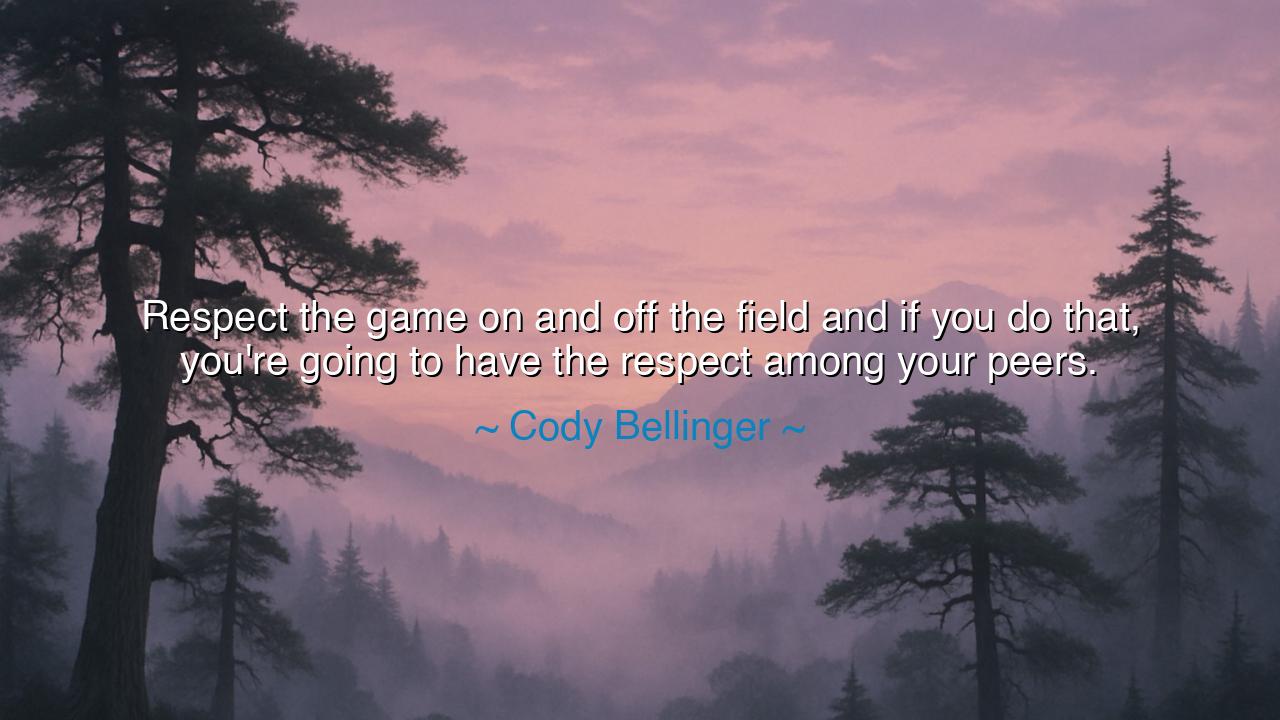
Respect the game on and off the field and if you do that, you're
Respect the game on and off the field and if you do that, you're going to have the respect among your peers.






"Respect the game on and off the field and if you do that, you're going to have the respect among your peers," says Cody Bellinger, and in these words lies a profound truth about the nature of respect, character, and the intersection between effort and honor. To truly honor the game, whether it be a sport or any other craft, requires a commitment not just to excellence in action but to a deep respect for the process, the tradition, and the values that underpin it. When one respects the game in all its facets, one earns the respect of others—not through superficial displays, but through integrity, discipline, and the humility to understand that success comes from both the effort and the character displayed on and off the field.
In the ancient world, the concept of respect for the game was foundational. The Greek Olympic Games were not simply athletic competitions; they were sacred rituals that honored the gods and the human spirit. The athletes who competed in the ancient Olympics were expected not just to demonstrate physical prowess, but also to embody the virtues of honor, humility, and discipline. Victory was sweet, but it was the spirit of the competition and the respect for one's opponents that elevated the athlete in the eyes of the community. A true champion was one who respected the game and the process, understanding that the real reward lay not in the trophy but in the integrity with which one played. In this way, the respect of one’s peers was earned through a life of discipline and honor, on and off the field.
This ancient view of respect also echoes through the story of Alexander the Great. As a young conqueror, Alexander was not only a master of battle but also a student of respect and leadership. He was known for showing respect to the cultures he encountered, learning from them and incorporating their strengths into his own strategies. His success was not simply due to his military prowess, but to his respect for those around him—his soldiers, his allies, and even his enemies. Alexander’s ability to maintain respect, whether in the heat of battle or in diplomacy, earned him the admiration of his peers. Respect for the game, in his case, meant understanding that true power comes not just from victory, but from how one conducts oneself in both triumph and defeat.
In the modern era, sports figures like Jackie Robinson exemplify the intersection of respect for the game and the impact of one’s actions off the field. Robinson, as the first African American to play in Major League Baseball, faced immense adversity. Yet, he maintained his respect for the game by excelling in his play and by conducting himself with dignity and professionalism off the field. Robinson's courage and integrity set a standard not just for athletes, but for all people, showing that true respect is earned by how one upholds the principles of honor, hard work, and grace in every part of life. His respect for the game led to the respect of his peers, and ultimately, to his place in history as one of the most revered figures in the world of sports.
Cody Bellinger’s words underscore the same essential truth: respect for the game is not limited to the moment of performance; it must be reflected in every aspect of life, in how we approach both success and failure. On the field, the athlete must give their best, not just for the sake of victory, but to honor the sport and the traditions that shape it. Off the field, the athlete’s character must be just as strong—reflecting the same values of discipline, respect, and humility. It is in the balance between these two that true respect is earned.
The lesson we take from Bellinger’s quote is one that extends far beyond sports: to truly excel in life, one must respect the process of growth and effort. Whether we are pursuing a craft, a profession, or a personal goal, it is not enough to only seek success; we must do so with honor and integrity, recognizing the value of the journey, not just the outcome. Respecting the game means dedicating oneself to doing one’s best, maintaining a spirit of fairness and humility, and upholding the values of the craft, regardless of external accolades.
In our own lives, we should strive to respect the game of whatever it is we do. Hard work, discipline, and integrity are the cornerstones upon which we build true respect. We must recognize that respect is not something that is given, but something that is earned through the manner in which we live our lives. Just as the ancient athletes respected the spirit of the games, and just as modern heroes like Robinson and Bellinger earned respect through their character and actions, we too can earn the respect of our peers by honoring the game—not just in the moments of success, but in every decision we make, every effort we put forth, and every challenge we face.






AAdministratorAdministrator
Welcome, honored guests. Please leave a comment, we will respond soon